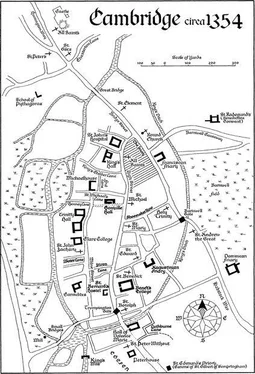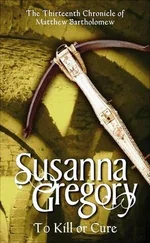‘And you are not busy at all, Matt,’ added Michael. ‘The first signs of spring have heartened people, so fewer of them are sick; it is coming up to Easter week, so we only teach in the mornings; and your treatise on fevers will never be finished. It is already longer than virtually everything written by Galen and you claim you are only just beginning.’
‘And you did find the body,’ Walcote pointed out.
‘I found an injured man,’ corrected Bartholomew. ‘But I can tell you nothing relevant. I asked who had stabbed him, but he was more concerned with the fact that he had lost his scrip than in telling me who had prematurely ended his life.’
‘Was that because he expected to recover?’ asked Michael. ‘Or because whatever was in his scrip was more important to him than seeing his killer brought to justice?’
‘I do not know, Brother. Dying people react in different ways. He may have been delirious. He had certainly swallowed a good deal of the laudanum I give to very ill patients, and that can cause people to say odd or irrelevant things.’
‘Pity,’ said Walcote. ‘If you had learned the name of the killer, you would not now be obliged to help us solve the crime. And I imagine it will take a while, because there are already questions regarding how it could have happened. I have the feeling this will transpire to be more complicated than a simple case of a Black Friar stabbing a White Friar during a riot.’
‘I agree,’ said Michael. ‘I feel it in my bones, and I am seldom wrong about such things.’
Bartholomew looked from Michael to his deputy. ‘You two have been in Cambridge too long! You are looking for complex solutions when there is a very simple one staring you in the face. Have you never heard of Occam’s razor?’
Walcote said approvingly, ‘Occam was a great man – a nominalist, like me.’
‘ You are a nominalist?’ asked Michael, startled. ‘What has induced you to follow a ridiculous notion like that?’
Walcote swallowed nervously, uncomfortable with Michael’s disapproval. ‘It makes sense. It is a good way of looking at the universe.’
‘So is realism,’ countered Michael.
Walcote immediately backed down in the way Bartholomew noted he always did when faced with serious opposition. It was an aspect of the Junior Proctor’s character that Bartholomew thought unappealing and Michael found aggravating. ‘I suppose it is. They both are.’
‘Actually, to be honest, I do not think one theory has any more to offer than the other,’ Michael went on pompously, also noting Walcote’s reluctance to stand up for what he believed. ‘They are both pathetic, desperate attempts that try to allow us to comprehend a world that was never created to be understood. What we are meant to understand is people – the lies they tell and the plots they hatch.’
‘As you say, Brother,’ said Walcote, chastened.
‘But we are not supposed to devise complex solutions to what are simple problems,’ said Bartholomew, trying to bring the discussion back to his original point. ‘That is the basis of Occam’s razor.’
‘What has Occam’s razor to do with Faricius’s death?’ asked Michael irritably. He seemed disheartened by Walcote’s meekness, and Bartholomew supposed he was questioning yet again the suitability of a man like Walcote to be a proctor.
‘It says that the conclusion with the fewest assumptions should always be taken over the one with more,’ said Bartholomew. ‘The simplest, most parsimonious theory is always the right one. Therefore, I deduce that the Carmelites are lying because Lincolne does not want to appear as though he has no control over his friars. And that is all.’
‘Believe what you will, Matt,’ said Michael superiorly. ‘You will find that you are wrong and we are right. It is too late today, but tomorrow morning you must come with me to the Dominican Friary to see whether you can identify these six student-friars you saw near Faricius before he died.’
‘Do you not think it wiser to go now?’ suggested Walcote timidly. ‘Why wait?’
‘Two reasons,’ replied Michael. ‘First, it is almost dark and friars will be preparing for compline. And second, because I want these Dominicans to reflect on what they have done. It may make them more willing to confess.’
‘But what if they take the opportunity to run away from Cambridge?’ asked Walcote uneasily. ‘You may visit the Dominican Friary tomorrow and find they have fled.’
‘I do not think so,’ said Michael comfortably. ‘The beadles will detain anyone attempting to leave Cambridge under cover of darkness, and to flee is a clear statement of guilt. We will have them either way.’
‘If you say so, Brother,’ said Walcote unhappily.
The Dominican Friary lay outside the town gates, to the east of the King’s Ditch. The Ditch split away from the River Cam near the castle in the north, then it and the river encircled the town like a huge pair of pincers until they met again in the south near the Trumpington Gate. Not only were the waterways clear markers of the town’s boundaries, but they provided a certain degree of protection. Few people were inclined to wade or swim across the sluggish, sewage-filled channels, so most traffic entering or leaving Cambridge went through one of its two gates or crossed one of its two bridges.
The oval-shaped area enclosed by the Ditch and the river was full to overflowing with buildings and tofts. This part of the town was little more than half a mile in length, and yet it boasted ten churches, several chapels, three friaries, St John’s Hospital and six of the University’s eight Colleges. In addition, there were about thirty hostels and halls, and a large number of houses in which the townsfolk lived. Some of these were grand and spacious, like the one that Bartholomew’s sister and her husband owned, while others were little more than hovels, clinging to each other in a losing battle against gravity.
When the Dominicans had first arrived in Cambridge in the 1230s, they had decided against wedging themselves into a town that was already bursting at the seams, and had instead purchased a house and land on Hadstock Way. From these humble beginnings, the friary had grown into an assortment of handsome buildings enclosed by a sturdy wall. The wall was necessary partly because rival Orders occasionally physically attacked each other, and partly because the friary’s location outside the town rendered it vulnerable to the attentions of outlaws.
Like Michaelhouse, the friary was built of a honey-coloured sandstone that had been specially imported from the quarries at Barnack, near Peterborough. There was a refectory with long tables where the friars ate, with a chamber above that served as their sleeping quarters. Then there was a separate kitchen block with an attic that provided accommodation for the servants, stables, and an elegant chapel and suite of rooms in which the Prior resided. A sizeable portion of the garden had been set aside as a graveyard – which Bartholomew recalled had seen a lot of use during the plague – and nearby were well-tended vegetable plots that provided cabbages, peas and beans to supplement the friars’ meals.
It was mid-morning, and the sun was fighting against heavy grey clouds. A few bright rays had penetrated the east window of St Michael’s Church that Palm Sunday morning, but by the time Bartholomew and Michael had eaten breakfast, any evidence of the approach of the long-awaited spring had been smothered by clouds that had blown in from the south west.
Normally, Bartholomew would have been resentful that Michael’s request to help him solve a murder obliged him to miss teaching duties, but Palm Sunday heralded the beginning of Easter Week, when lectures were only scheduled for the mornings, ostensibly so that the scholars could spend more time in church. Students and masters alike were looking forward to Easter Sunday the following week, when they would celebrate the end of the forty days of Lent with a feast. As Lincolne had noted, all the University’s students were restless and fretful, and the masters were finding it increasingly difficult to force them to study or to hold their concentration.
Читать дальше












